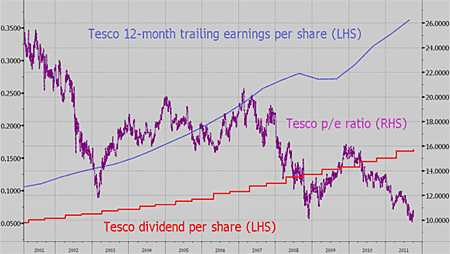It looks like the UK is headed for another recession. Normally when recessions start, there’s at least been a boom beforehand to cheer about. Not this time.
Britain’s ‘recovery’ from the 2008 crisis has hardly been worthy of the name. Our GDP grew by just 0.1% in the second quarter, according to revised figures from the Office for National Statistics.
We shouldn’t be too surprised. Britain is a consumer-driven economy. And consumers don’t feel like shopping – their spending fell by 0.8% in the second quarter. That’s the biggest fall since early 2009.
That sounds like bad news for people who sell things. So what does it mean for the share price of Britain’s biggest retailer, Tesco (LSE: TSCO)?
Bad news for retailers – British consumers are skint
British consumers’ disposable incomes are being clobbered. Taxes and prices are rising, while wages simply aren’t keeping up. As extra cash is needed to pay for essentials like fuel and food, there’s less available for everything else. And with unemployment rising again, there are fewer wage packets around anyway.
So it’s not a great time to be in any sort of retail business. It seems that even the mighty Tesco – whose tills take £1 out of every £8 that’s spent in the UK – can’t escape the clutches of a consumer slowdown.
Yesterday’s interim results showed that headline sales rose as usual. But like-for-like sales (these exclude new store openings, and also take out VAT and petrol sales) in the UK were down by 0.9% in the three months to 27 August. That’s the third quarter in a row that sales have fallen.
Indeed, Tesco reckons this is “the most challenging retail market we’ve seen for a generation”. And it doesn’t think things are going to improve much in the foreseeable future.
So where does that leave shareholders? In particular, what does it mean for those of you who bought the shares back in July when we suggested they were “good value”?
Tesco has stood up well to the market crash
Well, the good news for the latter is that you’re still doing OK. The shares are the same price as they were then. And bearing in mind what the overall market has done during that time – it’s plunged almost 15% – that’s a bit of a result.
And this is where we come to the key point about Tesco. If you look at the whole company, not just its UK business, then it’s still delivering the goods.
Business in Britain may stay in the doldrums for several years. But the company is stacking up sales around the rest of the world at a relentless rate. Global revenue excluding VAT climbed 8%. This was boosted by near-12% sales increases in Asia and Europe, and a 23% rise in the US.
What’s more, this is translating into decent profit growth too. Asian profits rose 19%, while Europe was up 12%. Even the tricky US market is improving. It’s still losing money, but losses were down by 23% and are “on track for a sharp reduction in the full year”.
Further, Tesco is sure it can keep doing the business in the future “despite an uncertain outlook for economic growth in the months ahead”. Of course, if the world falls into Great Recession Mk II, sales will be affected.
But unlike in the UK, which is saturated with its stores, Tesco has far more scope to expand outside these shores. It has a much lower share of international markets. That means it can keep expanding and adding to sales even if the overall size of these markets doesn’t increase or even shrinks.
A fantastic track record of dividend and profit increases
Of course, this depends on management being able to stay on top of its game in what could be a tricky few years. But when you look at the company’s track record over the last decade, that doesn’t look too big a risk. Take a look at the chart below.

Source: Bloomberg
The purple line shows Tesco’s p/e ratio. That’s the value placed on its earnings by the stock market. Since 2001, Tesco shares have been steadily ‘de-rated’. In other words, the p/e has more than halved from around 25 to below 11 for the current year.
Why? It’s partly because investors have generally favoured riskier cyclical stocks, and have neglected ‘defensive’ shares like Tesco over that time. And it’s partly because investors have worried that the group couldn’t keep up its growth rate.
Yet they needn’t have fretted. The blue line indicates Tesco’s earnings per share (EPS) over that time: as you can see, this has increased by 3½ times. And barring a slight dip in 2009, it’s been uphill all the way.
The red line is even more impressive. This is the dividend per share over the last decade. It’s been lifted by more than 200% during that time, with progressive rises every year.
In other words, over the past decade, Tesco has a practically flawless track record of making more money, and dishing more of it out to shareholders, every year.
Yet despite all this historic success, the market is now valuing Tesco on less than ten times next year’s forecast earnings, with a prospective dividend yield of 4%.
That has to be great value. And it explains why Tesco has done relatively well compared to the rest of the market during the recent plunge. Of course, if markets keep falling, the shares may well be dragged lower at some stage. But I’d be happy to buy at this level – so if you get the chance to snap up some stock even cheaper, you should take it.
Category: Economics

